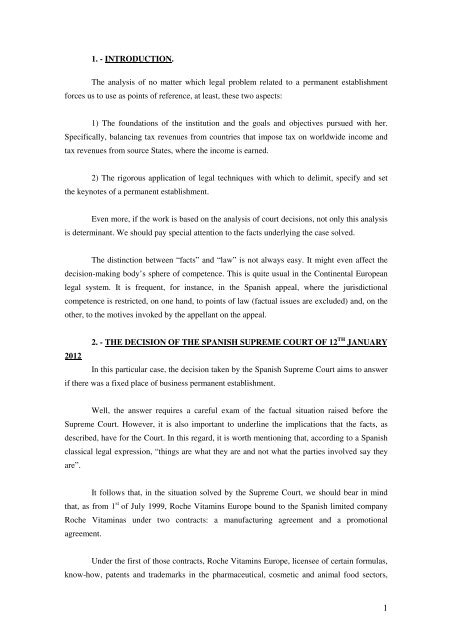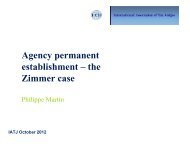Agency Permanent Establishment - Spain - Iatj.net
Agency Permanent Establishment - Spain - Iatj.net
Agency Permanent Establishment - Spain - Iatj.net
- No tags were found...
You also want an ePaper? Increase the reach of your titles
YUMPU automatically turns print PDFs into web optimized ePapers that Google loves.
1. - INTRODUCTION.The analysis of no matter which legal problem related to a permanent establishmentforces us to use as points of reference, at least, these two aspects:1) The foundations of the institution and the goals and objectives pursued with her.Specifically, balancing tax revenues from countries that impose tax on worldwide income andtax revenues from source States, where the income is earned.2) The rigorous application of legal techniques with which to delimit, specify and setthe keynotes of a permanent establishment.Even more, if the work is based on the analysis of court decisions, not only this analysisis determinant. We should pay special attention to the facts underlying the case solved.The distinction between “facts” and “law” is not always easy. It might even affect thedecision-making body’s sphere of competence. This is quite usual in the Continental Europeanlegal system. It is frequent, for instance, in the Spanish appeal, where the jurisdictionalcompetence is restricted, on one hand, to points of law (factual issues are excluded) and, on theother, to the motives invoked by the appellant on the appeal.2. - THE DECISION OF THE SPANISH SUPREME COURT OF 12 TH JANUARY2012In this particular case, the decision taken by the Spanish Supreme Court aims to answerif there was a fixed place of business permanent establishment.Well, the answer requires a careful exam of the factual situation raised before theSupreme Court. However, it is also important to underline the implications that the facts, asdescribed, have for the Court. In this regard, it is worth mentioning that, according to a Spanishclassical legal expression, “things are what they are and not what the parties involved say theyare”.It follows that, in the situation solved by the Supreme Court, we should bear in mindthat, as from 1 st of July 1999, Roche Vitamins Europe bound to the Spanish limited companyRoche Vitaminas under two contracts: a manufacturing agreement and a promotionalagreement.Under the first of those contracts, Roche Vitamins Europe, licensee of certain formulas,know-how, patents and trademarks in the pharmaceutical, cosmetic and animal food sectors,1
contracted Roche Vitaminas, the owner in our country, <strong>Spain</strong>, specifically in San Fernando deHenares, Madrid, of facilities used to manufacture products of those sectors for their subsequentsale. Roche Vitaminas undertook to prepare and package the products and to sell them to theSwiss company, pursuant to the instructions given by the latter, which undertook to acquirethose products. The price was determined for each year according to the production costs, towhich there was added a margin specified according to market criteria. Roche Vitaminasaccepted liability for defects due to incorrect application of quality parameters, while RocheVitamins Europe would bear those arising from improper specification of those parameters orfrom their modification after the goods were manufactured.In the second contract, Roche Vitaminas undertook to promote in <strong>Spain</strong> themerchandise, while Roche Vitamins Europe purchased from her, as well as those others whichthe Swiss company acquired in intra-community transactions. In addition, by virtue of thisbusiness, the former leased to the latter a warehouse of 22 square meters for deposit of theproducts prior to their distribution to the clients. In any event, the price of sale to third partieswas set by Roche Vitamins Europe, which issued and sent the relevant invoices, although thepurchase orders could be managed by either of the two companies indistinctly, without,however, the Spanish company being able to alter or negotiate the terms of sale or accept anycontract for the account of the Swiss Company. The compensation consisted of 2% of the salesin <strong>Spain</strong>, which would be added to the costs incurred by Roche Vitaminas, plus 750 pesetas foreach square meter of the leased warehouse.Both contracts, as is emphasized in the claim, entailed a change in strategy, wherebyRoche Vitaminas, theretofore manufacturer, importer and seller of the products, began toproduce them for a single client, Roche Vitamins Europe, who then proceeded to introducethem in the market. The aim was to reduce costs, by centralizing them in a single country:Switzerland.The Spanish Supreme Courts sets out its conclusions on the existence of a permanentestablishment in the following terms: “The Spanish company, during the term of the contracts,only existed to serve the Swiss company and, without running any risk whatsoever, tomanufacture its products according to its strict instructions, promoting them and participating inthe performance of the sales agreements. It had no other mission. This chamber is mindful thatproduction-to-order constitutes a normal practice in the market. Nor are we unaware that it ispossible to establish a price for the manufacture as a function of the costs, plus a remunerativepercentage for financing the production. And we can admit that the existence of companies withonly one client is not outlandish. But the conjunction of the three factors supports the deductionthat the case at issue here fulfils the defining characteristics of a dependent agent permanent2
establishment for purposes of the Spanish-Swiss treaty for the avoidance of double taxation, asfollows from the interpretation expounded above”.From this strict perspective, it may be concluded that Roche Vitaminas is not operatingin <strong>Spain</strong> as agent of Roche Vitamins Europe, because, as adduced in the claim, under the secondof the contracts signed, the promotional agreement, it did not have authority to concludecontracts in the name of the principal, not even to negotiate them, with its authority beingconfined to the management of purchase orders. Such information gives rise to the followingcomment: “Now, it must not be overlooked that the said contract also obliged it to promote theproducts that Roche Vitamins Europe purchased from it and stored in the leased premises, alongwith those acquired in intra-community transactions. This task introduces a point of greaterintensity in the relations between the two companies, as the Spanish was not confining itself toprocessing the purchase orders received from Switzerland, signing the contracts with nocapacity for innovation, but, due to its promotional authority, it had to do everything needed toenforce the qualities of the products offered by Roche Vitamins Europe. To this we must addthe existence of the manufacturing agreement, which we will now take up when considering thenegative perspective of the concept of dependent agent”.Accordingly: “The location of the business risks is a salient factor for measuring thedegree of independence. Now, in the case at issue here, it was borne by the foreign company, asthe negative consequences for Roche Vitaminas’s <strong>net</strong> worth of improper execution of the ordersreceived do not go beyond the effects that might be suffered by an employee who does notcomply with the orders of his principal adequately. It must be borne in mind that the more aprincipal/agent relationship resembles that of an employer/employee, the more likely that theagent will not be considered legally independent. In addition, given the price paid by RocheVitamins Europe to the Spanish company for the goods it produced (cost of production plus apercentage), it is plausible to deduce that the latter did not assume economic or financial risk. Inshort, “it is one thing to manufacture according to a customer’s instructions and even acceptprice ceilings […] and quite another one to manufacture for only one customer, at his orders andpursuant to his instructions […] at price equal to cost plus a simple commission […]” (fourthparagraph of foundation 4 of the assessment order dictated on 23 rd of April 2003 by the head ofthe inspectorate technical office).In summary, from the standpoint of interest here, Roche Vitamins Europe produced in<strong>Spain</strong> through a dependent agent, Roche Vitaminas, the goods that it later marketed, assumingthe contingencies proper to all business activity. It cannot be argued that the said manufacturingactivity was of an auxiliary, secondary or preparatory nature for its principal business. Thisshould be excluded under article 5 (3) of the treaty, which, intended to delimit the notion of3
fixed place of business, can be applied by analogy for an analysis of the position of dependentagent. In the first place, because, in fact, it was a basic condition without which the businessobject could not have been achieved. And, second, because it did not fit any of the auxiliary orpreparatory operations set down in that provision, which, given that it lays down an exception,should be construed restrictively”.Within this context, I find extremely interesting the considerations put forward by theSpanish Supreme Court by stating that: “Having established the foregoing, it bears emphasisthat the OECD Committee on Fiscal Affairs advocates a strict interpretation and application ofthis provision and, therefore, of the concept in question, because a broad interpretation wouldlead to finding permanent establishments exist in all cases where one enterprise engages incrossborder operations through a “dependent person”, and the resulting tax burden wouldhamper the interests of international economic relations (paragraph 32 of the commentary onarticle 5 of the Model Convention). Consequently, this classification should be limited to thosepersons who, given their power to contract, involve the non-resident enterprise in the businessactivities of the state of taxation. So it is a matter of evaluating the agent’s capacity toeffectively bind the principal enterprise to third parties. Needless to say that capacity must referto the contracts entered into within the scope of the business proper to the foreign enterprise”.It has been already said that the decision of the Spanish Supreme Court notablyprovides a dynamic interpretation of the wording of the Convention. But this is not true. On thecontrary, it provides that regarding the contracts between the Swiss company and the Spanishcompany, the former concluded contracts binding on the latter.3.- THE DECISIONS TAKEN BY OTHER SUPREME COURTS.It is interesting to note that other countries have rejected the existence of permanentestablishment. Examples include the Zimmer decision of the French Conseil d’État and the DellProducts decision of the Norwegian Supreme Court.From my point of view, these decisions offer different results, rather than contradictorysolutions, because they start from widely divergent positions and facts. Indeed, the contractsconcluded in the Zimmer and in the Dell Products cases were not as complex as the ones inwhich the Swiss company, Roche Vitamins Europe, entered.4. - CONCLUSION.In my opinion, the three judgements mentioned are different, but not contradictory,because the facts upon which the Supreme Courts decided were not the same.4





